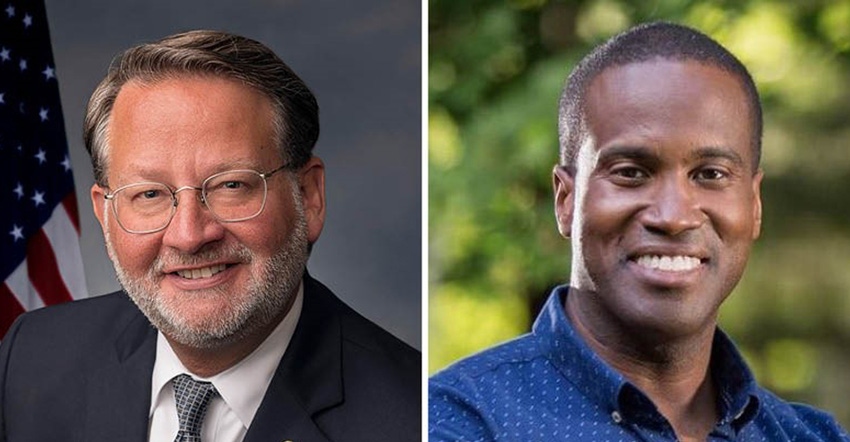May 8, 2020

The two U.S. Senate candidates vying to represent Michigan, incumbent Sen. Gary Peters and challenger John James, recently participated in a virtual interview forum conducted by Michigan Farm Bureau’s political action committee, AgriPAC.
Peters, an Alma College graduate, has served as a Michigan senator since 2015. Before that, he served three terms in the U.S. House of Representatives, two terms in the Michigan Senate and previously as Michigan’s lottery commissioner.
James, a Republican, is a graduate of the U.S. Military Academy and a combat veteran, having served eight years in the U.S. Army. He serves as president of the family business, James Group International, an integrated logistics and supply chain management firm.
Michigan Farm Bureau board member and AgriPAC committee chair Mike Fusilier, a Washtenaw County produce farmer, moderated the virtual interview forum, posing ag-specific questions to both candidates who are seeking MFB’s Friend of Agriculture endorsement.
Although the forum was scheduled months ago in Lansing, the COVID-19 pandemic required a change in plans. Fusilier said that the virtual interview forum was recorded and is being shared with all 65 county-level Farm Bureau candidate evaluation committees for a side-by-side comparison of each candidate’s response and policy positions.
“Our goal is to aid the Farm Bureau's grassroots endorsement process by sharing these interviews with county Farm Bureau candidate evaluation committees, so they're well-informed before making recommendations to the MFB AgriPAC committee,” Fusilier says. “We appreciate the willingness of both candidates to participate virtually, and we’re pleased how well it worked in light of the circumstances.”
Fusilier says the organization’s grassroots endorsement process begins at the local level, with farmers in each county Farm Bureau meeting to review races, voting records and interview candidates before making recommendations to the state-level MFB AgriPAC.
“AgriPAC makes the final decision, based on local input, as to who will receive the Friend of Agriculture endorsement,” Fusilier explains. “As a result of that well-respected grassroots endorsement process, the Friend of Agriculture endorsement is a highly sought designation by candidates seeking state and federal public offices.”
Recognizing a need and an opportunity to engage proactively in the political arena to enhance agriculture's voice, AgriPAC was formed in 1977.
Matt Kapp, MFB government relations specialist, says that the organization’s methodical endorsement process has garnered more than a golden reputation among political candidates.
“The success rates of AgriPAC-endorsed candidates ultimately being elected to office has been very impressive,” Kapp says, adding that local volunteer campaign support also is part of the endorsement package. “Over the last three elections, AgriPac has a 91% success rate, which is a testament to the value of the Friend of Agriculture endorsement.”
Kapp says that county candidate evaluation committees have until May 27 to provide their endorsement recommendations to the MFB AgriPac committee, including their pick for the U.S. Senate race between Peters and James, after watching the virtual interview forum and their responses to the following series of questions:
If you’re elected in November, what are the top three priorities you’d work on next year?
What are your thoughts about the role of biotechnology in food and agriculture, and what should be the government’s role in that debate?
Many sectors of the agriculture industry are seeing poor economic conditions and have been for years, making these very stressful times for farmers. What policies or initiatives would you lead that could have a positive impact?
International trade is critically important for both agriculture in general and Michigan’s economic viability — and we’ve seen a lot of activity lately on the trade front. What are your thoughts about the new USMCA, and how should the U.S. move forward in new trade negotiations?
The need for legal, skilled and reliable farm labor is a constant and growing need in agriculture. Immigration reform is desperately needed and remains the responsibility of the federal government. Do you support a new guest-worker program that can be used by all agricultural sectors, including those with year-round labor needs such as livestock and dairy? And what should be the path for workers currently here but working illegally?
Agriculture depends on modern and efficient infrastructure. We have a long way to go repairing and upgrading roads and bridges, ports and locks, and providing high-speed internet access in many parts of the state. What actions would you support and where would the funding come from?
Excessive, redundant and unnecessary federal regulations impede new business startup and economic growth in agriculture and many other industries. What are some specific regulations you would work to eliminate?
Washington’s climate is more partisan than ever. Many of our policy issues have traditionally been bipartisan in nature. What are some of your own bipartisan achievements and how will you work across party lines to help agriculture?
Source: Michigan Farm Bureau, which is solely responsible for the information provided and is wholly owned by the source. Informa Business Media and all its subsidiaries are not responsible for any of the content contained in this information asset.
You May Also Like




